Stool Sample in Molecular Biology Research:
- Utility and Applications:
- Stool samples are increasingly utilized in animal molecular genetics, population ecology, behavioral ecology, and intestinal disease diagnosis.
- They contain gut microbial DNA, food residue sample DNA, and alimentary tract exfoliated cell DNA.
- Challenges:
- Low content of exfoliated cells in the digestive tract and degradation of genetic material pose primary challenges.
- Presence of inhibitors such as polysaccharides, bile acids, bile salts, bile pigments, digestive juices, and mucus can affect PCR-based molecular analysis.
Importance of DNA Extraction:
Critical Role:
- Selecting appropriate extraction methods is crucial for obtaining high-quality DNA and ensuring successful downstream detection of stool DNA.
HiPure Stool DNA Kit:
- Solution Provided:
- The HiPure Stool DNA Kit from Magen Company offers a promising solution.
- Features good universality, high cost-effectiveness, high yield, and purification.
- Unique Features:
- Utilizes a unique solution system and inhibitory factor adsorbent to efficiently remove various impurities in stool samples.
- The purified DNA can be directly used for PCR, quantitative PCR, e altre applicazioni.
- Efficiency and Ease of Use:
- Enables rapid and reliable isolation of high-quality genomic DNA from various stool samples.
- Capable of processing up to 100 mg of stool samples within 60 minuti.
- Combines reversible nucleic acid binding properties with colonna rotante technology, eliminating PCR inhibiting compounds.
- Suitable for PCR, digestione restrittiva, and next-generation sequencing applications.
- Sustainability and Scalability:
- Eliminates the need for organic extractions, reducing plastic waste and hands-on time.
- Allows multiple samples to be processed in parallel, enhancing efficiency.
Dettagli
Specifiche
| Caratteristiche | Specifiche |
| Funzioni principali | Isolation total DNA from 50-100mg stool samples |
| Applicazioni | PCR, Southern Blot, enzyme digestion and NGS, eccetera. |
| Metodo di purificazione | Mini spin column |
| Tecnologia di purificazione | Tecnologia della silice |
| Metodo di processo | Manuale (centrifugazione o vuoto) |
| Tipo di campione | Sgabello |
| Importo del campione | 50-100mg |
| Yield | 3-15μg |
| Volume di eluizione | ≥30μl |
| Tempo per corsa | ≤60 minuti |
| Volume di trasporto del liquido per colonna | 750ml |
| Resa legante della colonna | 100μg |
Principio
Stool DNA Extraction Process:
- Homogenization and Lysis:
- Stool sample is homogenized and treated in a specially formulated buffer containing detergent.
- This step effectively lyses bacteria, yeast, and fungal samples present in the stool.
- Rimozione dei contaminanti:
- Our proprietary Absorber Solution is used to remove humic acid, proteine, polysaccharides, and other contaminants from the lysed sample.
- Binding and Washing:
- Adjusted binding conditions facilitate the attachment of DNA to a DNA Mini Column.
- Two rapid wash steps are performed to remove trace contaminants, ensuring purity of the DNA.
- Elution of Purified DNA:
- Pure DNA is eluted from the column in a low ionic strength buffer.
- The resulting purified DNA is ready for direct use in downstream applications without the need for further purification.
Vantaggi
- Purezza elevata – l'adsorbente unico può rimuovere completamente i fattori inibitori
- High concentration – maximum extraction of total DNA from stool samples
- Recupero elevato – Il DNA può essere recuperato a livello di PG
- Good repeatability – silica technology can obtain ideal results every time
Contenuto del kit
| Contenuti | D314102 | D314103 |
| Tempi di purificazione | 50 Preparativi | 250 Preparativi |
| HiPure DNA Mini Columns II | 50 | 250 |
| 2ml Provette di raccolta | 50 | 250 |
| 2ml Tubi a perline | 50 | 250 |
| Proteinasi K | 24 mg | 120 mg |
| Tampone di dissoluzione della proteasi | 1.8 ml | 10 ml |
| Buffer SPL | 40 ml | 200 ml |
| Buffer PCI | 40 ml | 200 ml |
| Buffer AL | 20 ml | 80 ml |
| Buffer GW1 | 22 ml | 88 ml |
| Buffer GW2 | 20 ml | 2 X 50 ml |
| Buffer AE | 15 ml | 30 ml |
Conservazione e stabilità
Storage Instructions:
- Proteinase K and Buffer PCI:
- Upon arrival, store at 2-8°C.
- Short-term storage (fino a 12 settimane) a temperatura ambiente (15-25°C) non influisce sulle loro prestazioni.
- Remaining Kit Components:
- Store at room temperature (15-25°C).
- Stable for at least 18 mesi in queste condizioni.
- Entire Kit:
- Can be stored at 2–8°C.
- Buffers should be redissolved before use if stored at this temperature.
- Ensure all buffers are at room temperature when used.

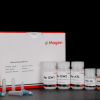
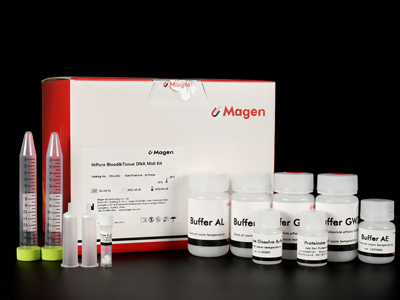
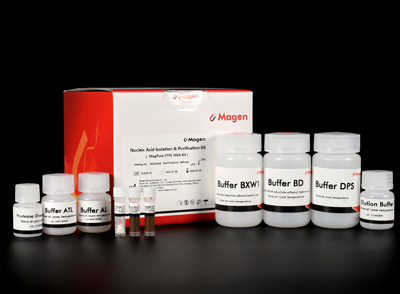
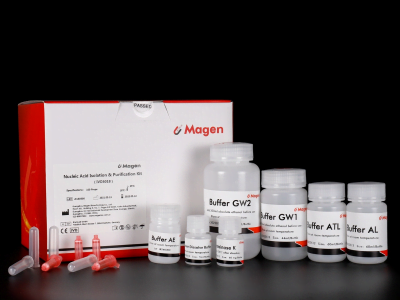
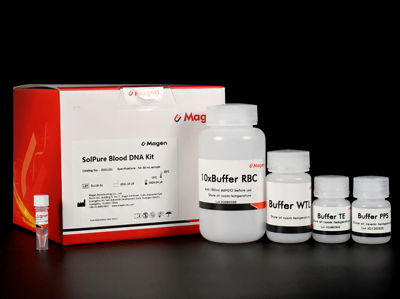
Recensioni
Non ci sono ancora recensioni.